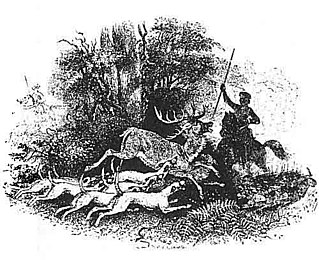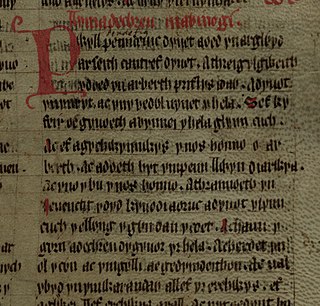Manawydan fab Llŷr is a figure of Welsh mythology, the son of Llŷr and the brother of Brân the Blessed and Brânwen. The first element in his name is cognate with the stem of the name of the Irish sea god Manannán mac Lir, and likely originated from the same Celtic deity as Manannán. Unlike Manannán, however, no surviving material connects him with the sea in any way except for his patronymic. Manawydan's most important appearances occur in the Second and Third Branches of the Mabinogi, but he is also referenced frequently in medieval poetry and the Welsh Triads.

Pryderi fab Pwyll is a prominent figure in Welsh mythology, the son of Pwyll and Rhiannon, and king of Dyfed after his father's death. He is the only character to appear in all Four Branches of the Mabinogi, although the size of his role varies from tale to tale. He is often equated with the divine son figure of Mabon ap Modron, while Jeffrey Gantz compares him to Peredur fab Efrawg, who is himself associated with the continental figure of Sir Percival de Galles.
In Welsh mythology, Math fab Mathonwy, also called Math ap Mathonwy was a king of Gwynedd who needed to rest his feet in the lap of a virgin unless he was at war, or he would die. The story of Math is the fourth of the Four Branches of the Mabinogi.
Lleu Llaw Gyffes is a hero of Welsh mythology. He appears most prominently in the Fourth Branch of the Mabinogi, the tale of Math fab Mathonwy, which tells the tale of his birth, his marriage, his death, his resurrection and his accession to the throne of Gwynedd. He is a warrior and magician, invariably associated with his uncle Gwydion.
In Welsh mythology, Arawn was the king of the otherworld realm of Annwn who appears prominently in the first branch of the Mabinogi, and alluded to in the fourth. In later tradition, the role of the king of Annwn was largely attributed to the Welsh psychopomp, Gwyn ap Nudd - meaning "white" a possible kenning for his true name. However, Arawn's memory is retained in a traditional saying found in an old Cardigan folktale:

Pwyll Pen Annwn is a prominent figure in Welsh mythology and literature, the lord of Dyfed, husband of Rhiannon and father of the hero Pryderi. Meaning ''wisdom" he is the eponymous hero of Pwyll Pendefig Dyfed, the first branch of the Four Branches of the Mabinogi, and also appears briefly as a member of Arthur's court in the medieval tale Culhwch ac Olwen. Pwyll, Prince of Dyfed also carries many similarities to the Mabinogi Branwen.

Rhiannon is a major figure in Welsh mythology, appearing in the First Branch of the Mabinogi, and again in the Third Branch. Ronald Hutton called her "one of the great female personalities in World literature", adding that "there is in fact, nobody quite like her in previous human literature". In the Mabinogi, Rhiannon is a strong-minded Otherworld woman, who chooses Pwyll, prince of Dyfed, as her consort, in preference to another man to whom she has already been betrothed. She is intelligent, politically strategic, beautiful, and famed for her wealth and generosity. With Pwyll she has a son, the hero Pryderi, who later inherits the lordship of Dyfed. She endures tragedy when her newborn child is abducted, and she is accused of infanticide. As a widow she marries Manawydan of the British royal family, and has further adventures involving enchantments.
Cigfa ferch Gwyn Glohoyw is a minor character in Welsh mythology, the wife of King Pryderi of Dyfed. She is mentioned briefly in the First Branch of the Mabinogi, and appears more prominently in the third. Describing the character, Proinsias Mac Cana writes: "Cigfa strikes one as a slight though effective vignette of a contemporary bourgeois snob while William John Gruffydd hypothesises that the character was a later addition to the tale." John Rhys suggested a connection between Cigfa and the Irish character Ciochba.

The Mabinogion are the earliest Welsh prose stories, and belong to the Matter of Britain. The stories were compiled in Middle Welsh in the 12th–13th centuries from earlier oral traditions. There are two main source manuscripts, created c. 1350–1410, as well as a few earlier fragments. The title covers a collection of eleven prose stories of widely different types, offering drama, philosophy, romance, tragedy, fantasy and humour, and created by various narrators over time. There is a classic hero quest, "Culhwch and Olwen"; a historic legend in "Lludd and Llefelys", complete with glimpses of a far off age; and other tales portray a very different King Arthur from the later popular versions. The highly sophisticated complexity of the Four Branches of the Mabinogi defies categorisation. The stories are so diverse that it has been argued that they are not even a true collection.

Welsh mythology consists of both folk traditions developed in Wales, and traditions developed by the Celtic Britons elsewhere before the end of the first millennium. As in most of the predominantly oral societies Celtic mythology and history were recorded orally by specialists such as druids. This oral record has been lost or altered as a result of outside contact and invasion over the years. Much of this altered mythology and history is preserved in medieval Welsh manuscripts, which include the Red Book of Hergest, the White Book of Rhydderch, the Book of Aneirin and the Book of Taliesin. Other works connected to Welsh mythology include the ninth-century Latin historical compilation Historia Brittonum and Geoffrey of Monmouth's twelfth-century Latin chronicle Historia Regum Britanniae, as well as later folklore, such as the materials collected in The Welsh Fairy Book by William Jenkyn Thomas (1908).
The Four Branches of the Mabinogi or Pedair Cainc Y Mabinogi are the earliest prose stories in the literature of Britain. Originally written in Wales in Middle Welsh, but widely available in translations, the Mabinogi is generally agreed to be a single work in four parts, or "branches." The interrelated tales can be read as mythology, political themes, romances, or magical fantasies. They appeal to a wide range of readers, from young children to the most sophisticated adult. The tales are popular today in book format, as storytelling or theatre performances; they appear in recordings and on film, and continue to inspire many reinterpretations in artwork and modern fiction.

Preiddeu Annwfn or Preiddeu Annwn is a cryptic poem of sixty lines in Middle Welsh, found in the Book of Taliesin. The text recounts an expedition with King Arthur to Annwfn or Annwn, the Otherworld in Welsh.
Llwyd ap Cil Coed is a character in the Third Branch of The Mabinogi, known also as the story of Manawydan ap Llŷr.

Prince of Annwn is a fantasy novel by American writer Evangeline Walton, the first in a series of four based on the Welsh Mabinogion. Originally intended for publication by Ballantine Books as a volume of the celebrated Ballantine Adult Fantasy series, it actually saw print only after the series was discontinued. It was first published in paperback by Ballantine Books in November 1974. It has been reprinted a number of times since, and gathered together with Walton's other Mabinogion novels by Overlook Press as the omnibus The Mabinogion Tetralogy in 2002. The novel has also been published in translation in several European languages. The other three novels in the series are The Island of the Mighty (1936), The Children of Llyr (1971), and The Song of Rhiannon (1972).

The Song of Rhiannon is a fantasy novel by American writer Evangeline Walton, the third in a series of four based on the Welsh Mabinogion. It was first published in paperback by Ballantine Books as the fifty-first volume of the Ballantine Adult Fantasy series in August, 1972. It has been reprinted a number of times since, and gathered together with Walton's other Mabinogion novels by Overlook Press as the omnibus The Mabinogion Tetralogy in 2002. The novel has also been published in translation in several European languages. The other three novels in the series are The Island of the Mighty (1936), The Children of Llyr (1971), and Prince of Annwn (1974).

Pwyll Pendefig Dyfed, "Pwyll, Prince of Dyfed," is a legendary tale from medieval Welsh literature and the first of the Four Branches of the Mabinogi. It tells of the friendship between Pwyll, prince of Dyfed, and Arawn, lord of Annwn, of the courting and marriage of Pwyll and Rhiannon and of the birth and disappearance of Pryderi. This branch introduces a number of storylines that reappear in later tales, including the alliance between Dyfed and Annwn, and the enmity between Pwyll and Gwawl. Along with the other branches, the tale can be found in the medieval Red Book of Hergest and White Book of Rhydderch.

Branwen ferch Llŷr; "Branwen, daughter of Llŷr" is a legendary tale from medieval Welsh literature and the second of the four branches of the Mabinogi. It concerns the children of Llŷr; Bendigeidfran, high king of Britain, and his siblings Manawydan and Branwen, and deals with the latter's marriage to Matholwch, king of Ireland. Matholwch's mistreatment of the British princess leads to a mutually destructive war between the two islands, the deaths of most of the principal characters, and the ascension of Caswallon fab Beli to the British throne. Along with the other branches, the tale can be found in the medieval Red Book of Hergest and White Book of Rhydderch. It is followed directly by the third branch, Manawydan fab Llŷr.

Manawydan fab Llŷr; "Manawydan, the son of Llŷr" is a legendary tale from medieval Welsh literature and the third of the four branches of the Mabinogi. It is a direct sequel to the second branch, Branwen ferch Llŷr, and deals with the aftermath of Bran's invasion of Ireland and the horrific enchantment that transforms Dyfed into a wasteland. The chief characters of the tale are Manawydan, rightful king of Britain, his friend Pryderi, the king of Dyfed and their respective wives Rhiannon and Cigfa. Along with the other branches, the tale can be found the medieval Red Book of Hergest and White Book of Rhydderch. Allusions to the tale can be found in two old triads retained in the Trioedd Ynys Prydein.

Math fab Mathonwy, "Math, the son of Mathonwy" is a legendary tale from medieval Welsh literature and the final of the four branches of the Mabinogi. It tells of a vicious war between the north and the south, of the birth of Lleu Llaw Gyffes and Dylan ail Don, of the tyngedau of Arianrhod, and of the creation of Blodeuwedd, a woman made of flowers. The chief characters of the tale are Math, king of Gwynedd, his nephew Gwydion, a magician, warrior and trickster, and Gwydion's own nephew, Lleu, cursed by his mother Arianrhod.
Black Colt is an Iranian folktale published by author Forough Hekmat in 1974. It is classified in the international Aarne-Thompson-Uther Index as ATU 314, "Goldener".










